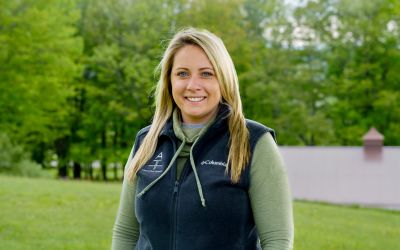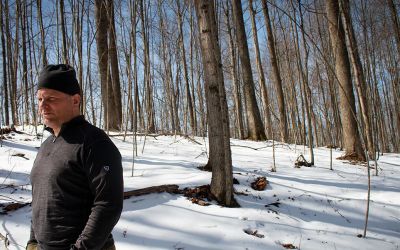Carbon Program Assists a Family’s West Virginia Tree Farm
Jeremy Brubeck recalls one morning decades ago when he was in his late teens or early 20s, sitting in a deer stand at dawn on his family’s 143-acre woodland property in Pocahontas County, West Virginia. “As the sun came up, I remember watching the forest come alive,” Jeremy said. “And I made the point to myself, ‘I’ll never forget this.’ I felt so insignificant—the scale of all this jaw-dropping beauty was just amazing to me”. The land has been under Brubeck’s ownership since 1989 when Earl Brubeck, Jeremy’s father, purchased the bulk of the property. Earl had fallen in love with the area in the late 1970s on regular hunting trips with a friend.

Jeremy Brubeck and his wife and daughter live on the family’s Windy Ridge property. They are committed to the forest's long-term care. Windy Ridge is an American Tree Farm that's also enrolled in the Family Forest Carbon Program.
The Brubeck’s routinely visited the land to enjoy the outdoors, traveling from their home in Williamsport, Maryland. “It’s a place that makes me feel better every time,” Earl said. “It makes me feel better when I pull out of my driveway at home to go there, and it makes me feel better after having spent time there. It takes you away from the hustle and bustle of day-to-day life and work.”
Jeremy said the property has good, marketable timber, but he and Jeremy agree it will not be ready to cut for another 10 to 15 years—a view supported by forestry professionals who have weighed in. However, Brubeck needs income from the land to help support its management. That’s where the Family Forest Carbon Program is stepping in. The program, developed by the American Forest Foundation and The Nature Conservancy, helps family forest owners access climate finance from carbon markets, empowering them to address climate change while earning income from their land. Jeremy learned about the program through a Facebook ad. He was intrigued to research further, exploring possibilities for the Brubeck farm.
“I didn’t see any downside,” Jeremy said. “It just seemed like a perfect fit. Here’s a program that will pay us not to cut our timber for 20 years—and we have professionals at no expense who are going to help us. To me, it’s a no-brainer."
Earl also expressed excitement about the program’s income and free professional forest management support components. “There are some really wonderful benefits to the program,” Earl said. “And they will help us keep making the place even better than it is for future generations.” Today, Jeremy, with his wife and 7-year-old daughter, reside off the grid in a solar-powered home on the tree farm. Jeremy’s daughter is around the same age he was when his father bought the land, and on a recent night, she pointed out a blinking star with excitement. Jeremy had a reminder for her—one he often has for himself. “Not everybody gets to experience what we experience here, and we should always appreciate that,” he said.

Two streams run through the Windy Ridge property. Brubeck's daughter explores the streambeds and native forest ecosystem. The health of the trees plays an important role in the health of the streams.
Related Articles

July 14, 2023
Forester Spotlight: Emily Trent
Meet Emily Trent from Pennsylvania! Emily’s forestry expertise is built on a foundation of conservation, environmental biology and education. She has a Bachelor of Science in Ecology, Conservation and Environmental Biology, with a minor in Geography from Indiana University of Pennsylvania.
July 25, 2023
Helping the Planet Heal: PA Landowner on Local NPR
“I’m contributing to helping the planet heal, to helping our species to be able to survive.” Louise Hartman's family works with FFCP to manage their lands.

November 17, 2022
West Virginia Landowner Is Keeping His Land in the Family
Jarrod Hatfield, a West Virginia landowner enrolled in the American Forest Foundation's Family Forest Carbon Program, recently shared his story with our partners at REI.